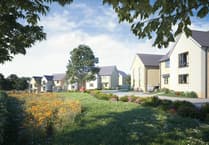More than 100 years of Bath’s housing history has been preserved and made accessible following a two-year project carried out by staff at Bath Record Office.
The project, Building a Healthier City 2, was funded by Wellcome, which awarded Bath Record Office £172,750 to catalogue, conserve and make available the records relating to slum clearance, council housing and renovation of ‘unfit’ properties in the city between 1890 and 1995.
Staff catalogued around 90 metres of records, repackaging and carrying out remedial conservation where necessary to ensure they were preserved and accessible. The catalogue is now available online.
There are several collections in the project, including a series featuring plans and photographs relating to the redevelopment of the Snow Hill area and the rebuilding at Lampards Buildings and Dolemeads under the Housing of the Working Classes Act (1890).
Another series features Bath City Council Contracts showing the development of council housing in the city in the twentieth century and records of temporary housing post 1945 and demolition and clearance of bomb-damaged sites.
Some of the earliest records relate to Dolemeads and Lampards Buildings and later records cover Avon Street, Holloway and Foxhill. Other areas included are Englishcombe Lane/Englishcombe Park (now The Oval), Rudmore Park, Southdown, Kingsmead flats, Roundhill and Whiteway, Twerton and Moorlands and Snow Hill.
The records show that Bath City Council was an early adopter of powers to build new properties. Under the Housing of the Working Classes Act of 1890, the council built more than 77 homes and following the introduction of government subsidies for house building in 1919, Bath Corporation started construction of the first of many new estates.
Councillor Matt McCabe, cabinet member for Built Environment and Sustainable Development, said: “As we write a new chapter in Bath’s Housing History, with our plan for new council house building, this is a fascinating and interesting reminder of our housing history and the great attempts that have been made to improve people’s lives in the past.
“Bath & North East Somerset Council remains focused on creating affordable homes for social rent and this year the first general needs homes owned directly by the council were prioritised for NHS staff working in the electoral ward of Newbridge. The seven apartments at Newbridge Hill are the start of a pipeline of nearly 200 properties which will be delivered through the council’s ‘B&NES Homes’ programme with an initial £12m provided to develop another 50 council houses for rent.”
The project has opened up valuable new opportunities for research into the relationship between housing and health and will allow an understanding of the different ways unhealthy housing was replaced or renovated in the city and allow researchers to assess the success or failure of the different approaches.
Councillor Paul Roper, cabinet member for Economic & Cultural Sustainable Development, said: “Delivering new council housing is one of Bath & North East Somerset Council’s core strategies, and this project can help us to understand how different approaches to improving housing and building new houses have worked in the past. These fascinating records and photos will also be of interest to residents who want to find out more about the history of the areas in which they live.”
Wellcome also awarded Bath Record Office a Research Enrichment Grant of £17,900 which was used to run a community engagement project called: ‘Imagine: a hundred years of homes in Bath’. Local community groups attended workshops on architectural drawing, map-making, poetry and clay modelling. Artworks and writing from the project have been added to the collections of the record office. You can find more information on the Bath Record Office website:
Wellcome previously awarded Bath Record Office £138,000 to make records available relating to improvements in Bath’s public health from the 1700s to the 1900s. You can find more information on that project, Building a Healthier City, on the Bath Record Office website.
You can find more information on the project webpage or by contacting the project team at Bath Record Office by email [email protected] or calling 01225 477421. You can also book an appointment to visit and consult the collection.



